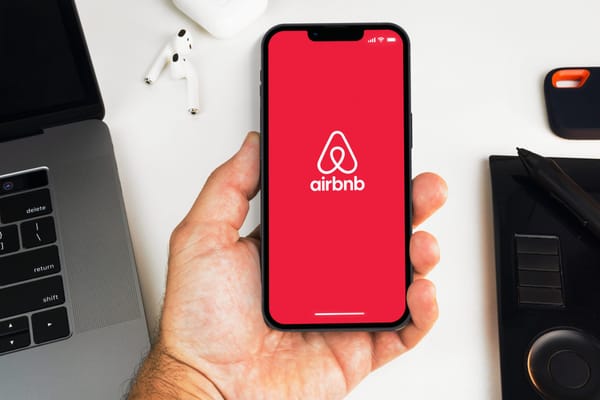Is Owning an Airbnb Still Profitable? An In-Depth Review

Owning an Airbnb has its benefits as well as a fair share of challenges, and hosts may be wondering if owning an Airbnb is still profitable. Get a deeper understanding of the pros and cons of owning a short-term rental, as well as strategies for achieving success in the vacation rental industry.
The financial returns of owning an Airbnb business can be rewarding, but it also comes with a certain amount of risk.
Take a look at the big picture: The Airbnb Host community surpassed 5 million Hosts around the globe. Active listings exceeded 7.7 million by the end of 2023, increasing 18% year-over-year with sustained double-digit supply growth across all regions.
Still, before taking the plunge and investing in a vacation rental property, it’s advisable to weigh up all the pros and cons that come with it. Let’s dive in and explore the benefits and challenges of owning an Airbnb home.

Is Owning an Airbnb Profitable?
The latest data Airbnb released to the public shows that hosts earned an average of $14,000 in 2023. This figure includes hosts who use Airbnb for supplemental income, many of whom rent out shared spaces.
Hosts who fully commit to the Airbnb business can earn more. According to AirDNA, the average monthly income for Airbnb hosts in the U.S. is $4,300 in 2024.
If you are a prospective host or property manager, you shouldn’t expect to start generating revenue instantly. It takes time to market your rental to attract guests, receive reservations, and generate revenue.
What are the Benefits of Owning an Airbnb over Traditional Renting?
Both Airbnb and traditional long-term renting to tenants have their pros and cons.
Owning an Airbnb has unique benefits that regular leasing does not:
- Greater revenue potential than traditional leasing
A benefit of owning Airbnb properties is earning more rental income compared to regular property leasing. While traditional rental properties work with fixed pricing, Airbnb hosts are able to adjust their pricing when they see fit.
- The potential for offering additional services
In traditional renting, a tenant occupies a property and has little contact with their landlord, leaving minimal opportunity for the latter to earn any additional revenue outside of rent.
However, for hosts, owning an Airbnb rental property provides the potential for earning extra income by offering additional services. These services can include breakfast, transportation, laundry services, and offering Airbnb Experiences to guests.
- A more diverse portfolio of guests
With vacation rental hosting, hosts generally see a turnover of at least several guests a month (unless they offer a long-term rental).
- You have more control over your property
Owning an Airbnb rental allows you more control over your property than traditional renting. Having a greater guest turnover means you can conduct more regular inspections of the property and pick up on potential problems sooner rather than later.
Another benefit of owning a vacation rental/Airbnb listing is that you’re more free to adjust and increase your prices, giving you greater control over your pricing policy.
What are the Challenges that Come with an Airbnb?
- The market is competitive
The short-term rental market is extremely competitive. You will need to keep an eye on what your competitors are doing and monitor what marketing strategies they are implementing. Doing this will ensure you don’t get left behind by the competition.
- You will need to adhere to Airbnb regulations in your area
Different cities and zones have unique Airbnb regulations and restrictions imposed on them. Depending on where your Airbnb property is located, you will have to adhere to the regulations relative to that city, zone, or neighborhood.
- Managing the property will require time and effort
Managing a vacation rental takes a lot of time, and you will need to be capable of juggling several different tasks at once. Make sure you are willing and able to handle a consistent inflow of work that you’ll have to put in to keep the property up and running.
- You may have to deal with difficult or badly behaved guests
Guests may make complicated requests or throw an unauthorized party at your rental. On top of that, they can also break or damage things in your property, by accident or on purpose.
Thankfully, difficult guests tend to remain in the minority, and you can prevent them from booking with you by charging a security deposit.
The 25 rule is Airbnb’s policy serves to reduce party risks by imposing stricter regulations on guests under 25 years old who want to book an entire property.

How to Find Success in the Vacation Rental Industry
Needless to say, as with any entrepreneur, hosts face risks, challenges, and as a rule tough competition. However, there are some steps you can take to help ensure long-term success:
1. Draw up a comprehensive business plan
Draft a plan that covers every step of creating your business. Include your short and long-term goals, potential setbacks and obstacles, and how you plan to overcome them. You’ll need to take into account the likes of sales tax, and other legal business entity concerns.
Download Free Business Plan Template!
2. Calculate how much capital you will need to start
Starting a business costs money, and you don’t want to underestimate your expenses. Consider consulting with an Airbnb business consultant who can review your plan and give recommendations on your initial capital.
3. Determine how much monthly recurring expenses will cost
Another important calculation to get right is your monthly recurring expenditure. Make a list of the monthly fees you pay for cleaning, maintenance, marketing, internet, insurance, services, and a property manager (if you work with one).
4. Calculate the occupancy rate you will need to generate profit
Once you have worked out what your fixed monthly charges are, you can work out what rate of occupancy you will need to hit to cover them, and what pricing strategy you should employ to meet your target passive income.
5. Account for slow periods and low seasons
Every rental property has a high season and a low season, as well as quieter periods. To stay afloat during these times, you’ll need to make sure you have enough savings to cover your recurring fixtures so that you will not be making a loss.

6. Focus on guest communication to keep ratings high
In the Airbnb business, keeping up the 5-star reviews directly determines the profit. Positive reviews on the platform confirm that guest experience is at the highest level, and many travelers look at reviews when deciding what listing to book. That's why promptly answering guests really makes a difference in improving guest satisfaction.
One thing hosts can do to make their lives easier is to use communication software that will use event-triggered messages. Guest messaging automation drastically reduces the number of custom messages you write to guests and frees up your time by far. Tools like iGMS are specialized in doing this work for you.
7. Show respect to neighbors and community
The reasons why Airbnb is banned in some urban areas are the housing shortage and neighbors' complaints about Airbnb guests. When renting out an Airbnb, try to keep a friendly relationship with the larger community. Respecting neighbors will lead to fewer disputes and more understanding on their end for your Airbnb business.
Let your neighbors know that your property is an Airbnb and provide your contact details in case any issues arise. If they have concerns, address them promptly and professionally.
Also, it's nice to support local businesses, like restaurants and cafés, by including their addresses in your local guide and welcome book.
How to Find a Good Real Estate Investment Property
When it comes to finding your ideal Airbnb rental property, there are no hard rules you have to follow. It’s a good idea, however, to follow some known best practices:
- Do research beforehand on zoning laws
Before you start seriously looking at real estate for potential Airbnb properties in an area, you need to have an understanding of the area’s Airbnb and zoning regulations.
For instance, the 90-day rule applies in certain cities where local regulations restrict short-term rentals to a maximum of 90 days per year.
- Work with a real estate agent or company that specializes in vacation rentals
If you’re a first-time investor or have no background in property management, consider partnering with an estate agent or company that specializes in short-term rental real estate.
- Use analytics to help you make smart investment decisions
If you’d prefer to work on your own, make use of analytics and data to make smart, informed decisions. Tools you can use include heatmaps, investment property search engines, and Airbnb calculators to make the best investments for your rental business.
Inputting your personal data and requirements into them helps generate relevant metrics for you, such as a property’s cash flow, its cash-on-cash return, and potential occupancy rate.
Top 3 Vacation Rental Data Sites for Short-Term Rental Property Airbnb Investment
1. AirDNA
AirDNA is one of the premier companies specializing in short-term rental data for prospective and current rental owners. AirDNA offers valuable data and insight into over 10 million rentals in over 120K global markets.
2. Mashvisor
Offering a heatmap, real estate finder, and rental property calculator, Mashvisor helps thousands of U.S. Airbnb hosts conduct market research and access the most lucrative investment opportunities in high-demand areas.
3. AllTheRooms
Offering 3 key metrics — Market Intelligence, Property Score, and Competitive Intelligence, AlltheRooms offers invaluable insights to unlock the full potential of your short-term rentals.
Buying an Airbnb Investment Property: Things to Keep in Mind
Keep your target guest in mind
Your property should appeal to your target guest, so you should offer features that suit their requirements. If you want to appeal to families, opt for a slightly larger property that can accommodate at least 4 Airbnb guests.
Think about property management
If you are thinking about managing your property remotely, remember that you will need to factor in the costs of hiring a local onsite manager or management company. Other things to take into account include cleaning, maintenance, and emergency responses.

How to Start an Airbnb Business Without an Airbnb Property?
Are you interested in having your own Airbnb business, but you don’t own or have the means to purchase real estate? Never fear because you don’t necessarily have to own a home to do so.
Make money with Airbnb rental arbitrage
One of the most popular ways to start an Airbnb business without owning any property is with Airbnb rental arbitrage. Vacation rental arbitrage is the practice of renting a property to sublet it to guests. Keep in mind that for this endeavor to be successful, you will need to charge more than what you pay as the registered tenant.
You will also need to have written permission from your landlord that you are allowed to sublet their property. If the property is in a housing complex, you may need to get permission from the related homeowner’s association to sublet an Airbnb rental.
Become an Airbnb property manager
Becoming a property manager is another means of starting your Airbnb business. It’s not an easy task to become a property manager, and you will likely need to undertake a registered course in order to become certified.
Start an Airbnb consultation business
Another way is to start your own Airbnb consultation business. It’s ideal to incorporate your unique professional qualification to offer as a niche specialization to hosts. For example, if you come from a marketing background, you could offer specialized services to help hosts improve their Airbnb marketing results.
How to Make Ownership of an Airbnb Business Easier with Automation?
One of the best ways to overcome Airbnb hosting challenges is automating daily tasks by using vacation rental software, such as iGMS.
iGMS helps hosts and property managers take their rental businesses to the next level. Harnessing automation functionality, you’ll be able to:
- Managing multiple accounts and listings on the top OTAs from a single interface
- Synchronizing reservations across multiple platforms to eliminate the risk of double bookings
- Organizing messages into a single feed with a unified inbox
- Improving communication with automated templates and triggered messaging
About the Author
Phoebe Gunning is a ormer content writer in the Marketing Department at iGMS. She is passionate about the vacation rental industry, notably helping hosts make the most out of their vacation rental businesses. Some of her hobbies include reading, traveling, and drinking a good cup of coffee.






